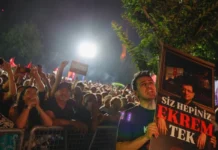
By Abdullah Bozkurt
The president of Turkey, Recep Tayyip Erdoğan, has contracted some of his clandestine operations to mafia leaders who have apparently pledged to serve in advancing the Turkish leader’s petty interests both at home and abroad in exchange for political cover and legal immunity for their illicit activities.
One man who stands out from the rest in the pro-Erdoğan alliance is Sedat Peker, a convicted mafia leader who was recently acquitted by a Turkish court after he threatened 1,128 academics and intellectuals with a murder spree following their call for a peaceful settlement of the Kurdish problem. Although he was indicted and faced up to 11 years in prison for the issuance of a threat and incitement to violence for remarks in which he said, “We will spill your blood in streams and we will shower in your blood,” the Anadolu 20th Criminal Court of First Instance ruled to acquit him. Peker did not even bother to show up for a hearing on July 13, 2018 during which the court said his threats did not lead to any action and dropped both charges. Peker’s outrageous remarks came a day after Erdoğan targeted academics and labeled them terrorist supporters.
This came on the heels of another acquittal by the Anadolu 41st Criminal Court of First Instance, which ruled on June 21, 2018 that Peker’s statements should be considered expressions of patriotism. The court found nothing wrong with Peker’s statement in which he said members of the Gülen movement would be hanged from flagpoles and trees in the streets and later that those who were in prison would be killed as well. Peker was indicted by a prosecutor on charges of incitement to violence, but the court decided to let him go even though he was facing up to five years. He has threatened Russia in the past, advocating a view that Chechen militants should be trained by Turkish intelligence to be unleashed in Russia. Similar threats were made against Europe and Israel over their criticism of Erdoğan.
Peker is a dangerous criminal who acts like an attack dog for Erdoğan whenever the Turkish president needs to ruffle the feathers of his opponents. Since he is not officially linked to Erdoğan’s office, this would serve as plausible deniability when he brings so much heat to his presidency. Peker’s operations outside of Turkey pose a risk to Turkey’s allies and partners as well, considering how he was linked to jihadist figures in Syria. He has been sending bulletproof vests and pickup trucks to militant thugs in Syria, where they are aligned with the Erdoğan government as proxy groups.
I did some digging into this unsavory character and have come up with some interesting findings. It turns out he had worked for ultranationalist groups operating within the Turkish military and civil service for years. Born in 1972 in the province of Rize, Erdoğan’s hometown, Peker is a criminal who has been detained numerous times and faced legal action on a range of charges including racketeering, organized crime, kidnap and ransom, and bodily harm to others. He was formally arrested in 2004 and convicted to 14 years, six months in a trial at the Istanbul 9th High Criminal Court.
He was recruited as an operative in 1992 by Veli Küçük, a Turkish brigadier general who set up the notorious intelligence branch called JİTEM within the Turkish Gendarmerie and a known figure in extrajudicial killings in Turkey, especially in the Southeast, where Kurds have been oppressed for decades. Küçük knew Peker’s father Ahmet and took him under his wing during his younger years. After retirement, the Turkish general was arrested, in January 2008, and sentenced to life in prison in a trial that concluded in August 2013. Erdoğan moved to save Küçük and his associates after his party rushed through a bill in Parliament removing the authority of the court that had conducted the trial. Küçük is also believed to have helped Peker in obtaining a fraudulent health report that exempted the mafia leader from serving his compulsory military service in the Turkish army. The two have cultivated very close ties, so much so that even the salary of driver Emin Caner Yiğit, one of Peker’s men, was paid by the mafia leader.
In a wiretap intercepted on July 21, 2004 at 17.56 hours, Peker admitted how he was involved in murders such as drive-by shootings that targeted coffeehouses in Turkey at the order of shadowy figures in military intelligence. The police investigation concluded that Peker was talking about an incident on March 12, 1995 during which three cafés and a cake shop were fired on with an automatic rifle during a drive-by shooting spree. Halil Kaya, a 61-year-old Alevi religious leader, was killed and dozens of other were injured. The Gazi district, mostly populated by minority Alevi groups, saw riots and rallies in the aftermath, leading to clashes with the police and resulting in the death of 23 people. Eyewitness testimony in 2008 also showed that the plot was orchestrated by Küçük in cooperation with Peker and Osman Gürbüz, another operative who was trained by the gendarmerie in special and psychological warfare.
Peker also had a handler at the National Intelligence Organization (MİT) identified as Yavuz Ataç, who led MİT’s foreign operations department. Ataç was forced to resign after a scandal broke in the late 1990s showing that he had provided a diplomatic passport to Alaatin Çakıcı, another mafia leader. Peker’s name came up during another investigation into an assassination plot that targeted Kurdish politicians and Turkish author and Nobel laureate Orhan Pamuk.
The wiretap intercepted by investigators on Oct. 2, 2007 at 20.26 hours featured two suspects, identified as Muhammet Yüce and Coşkun Çalık, talking about what would happen to them if they were to be caught after the hits. They were saying that Peker would make sure they would be transferred to the prison where he was incarcerated and that they would stay there comfortably and be paid handsomely for the contract. Fifteen minutes before this phone conversation, Yüce sent an SMS message to Çalık saying: “We are going to take care of journalist Orhan Pamuk and receive 2 trillion (TL 2 million, or roughly $1.6 million). We are going to make the necessary preparations.” In the message Yüce said his associate had already talked to people who were involved in the murder of Hrant Dink [an Armenian-Turkish journalist who was assassinated on Jan. 19, 2007] and emphasized that Peker and Çakıcı both backed their plans.
Police interrogated Çalık and asked about thee telephone conversations. In his statement Çalık said the first contract was the murder of Kurdish politician and member of Parliament Ahmet Türk but that he felt uneasy about the assassination and feared his family could face reprisal by the Kurdistan Workers’ Party (PKK). When he told this to Col. Fikri Mehmet Karadağ, another shadowy figure in the ultranationalist network, the colonel asked them to kill Pamuk instead. He also added that in the event of their capture, Yüce told him that Peker would ensure their well being in prison. When the police discovered it, Pamuk’s assassination plot was thwarted.
Looking at this man’s background and how he was linked to shadowy elements in Turkish government including Turkish intelligence agency MİT, one must assume his threats carry some weight. He is clearly enjoying impunity and immunity from any prosecution thanks to Erdoğan’s protective cover. He must be monitored closely on how he has been spreading his wings abroad in order to expose any dirty dealings he is planning to execute on behalf of the Turkish dictator. (turkishminute.com)














